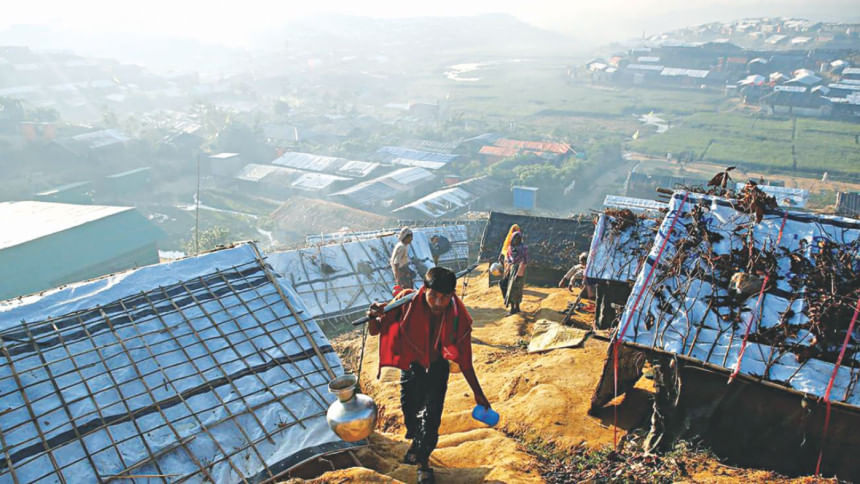Rohingya genocide & the politics of terminologies

Rohingyas are now the world's most persecuted community. World powers and rights advocates however struggle hard in finding an appropriate terminology for the persecution. With the politics of regional influence, investment and arms deals in the background, China, India, Russia and United States are playing with words to downplay a clear case of genocide. International human rights bodies and governments are merely lurking behind the reality under some elusive terminological pretexts.This write up attempts to understand this politics of terminology from a critical perspective and seeks to locate where Bangladesh's position should ideally be.
While Norendra Modi's ultra-right BJP government is more concerned with the “extremist violence” in Myanmar,it hopes for “peace, justice, dignity, and democratic values for all.” China sees it as an essentially “internal” problem of Myanmar and “sincerely hopes [Myanmar] to restore stability as soon as possible and the local people [to] live a normal life again.” Russia, on the other hand, sees the problem as an “inter-religious conflict” that must be resolved through inter-religious dialogue. After the initial “voicing of concern” over the issue, the cautious and calculative United States has recently elevated its understanding to an “ethnic cleansing” and “horrendous atrocities” causing “tremendous suffering” to the Rohingya population.
At the organisational level, the United Nations Secretary General diplomatically calls it a “human rights nightmare.” Amnesty International, however, has travelled up to the “Crime Against Humanity.” Human Rights Watch on the other hand adopted “Ethnic Cleansing”. The United Nations High Commissioner for Human Rights also termed it “a textbook example of ethnic cleansing”.The UK government approached the problem as a “fastest growing humanitarian catastrophe.” Interestingly, a recent statement of the UK Foreign office suggests that they received "very troubling" evidence which “will be used to assess whether genocide has been committed” against Rohingya Muslims in Burma.
While the latest position of the UK government marks a welcome sign of growing international awareness about the issue, a recent seminar in the UK Parliament (Seminar on International Response to Rohingya Crisis organised by Centre for Turkey Studies, 29 November 2017) calls the time a ripe one for terming the atrocity a genocide plain and simple. The keynote speaker of the seminar was Professor Penelope J Green, Founder and Director ofInternational State Crime Initiative (ISCI) based in the Queen Mary University London. In 2015, ISCI conducted an18-month-long study on the Rohingya persecution and published its report titled, “Countdown to Annihilation: Genocide in Myanmar.” Though the 2015 report of ISCI termed the process as a “highly organised and genocidal in intent”, Professor Green is convinced that it is visibly and undoubtedly a genocide now. A shadow students' tribunal staged recently by the Society for Critical Legal Studies in Chittagong has proved that elements of genocide are strongly present in Myanmar. Even before that, a leading jurist of the country Barrister M Amir-Ul Islam framed the case as a “Clinical Illustration of Genocide” in one of his presentations before the SAARC LAW conference in Sri Lanka.
ISCI has endorsedthe Six Stage of Genocide Model of Professor Daniel Feierstein (Genocide as Social Practice). It is a prism through which ISCI considered how the Rohingya persecution elevated to genocide.The process started with stigmatisation. Starting with the denial of citizenship in 1970s, Rohingya community has been successfully alienated from the Burmese citizenry. With all deliberative official patronisation, the group has been snatched away of their “Rohingya” identity. With an enforced identity “illegal Bengali migrants” tagged over them, they have been made extremely unpopular among the Burmese majority. At the second stage of the process, official and unofficial harassment, deprivation, arbitrary arrests and detention, violence and terror were unleashed for a considerable period of time. Third stage of the process involved political, legal, social and geographical isolation to sever their historically existing relations with the broader Burmese community. Fourth stage of the process involved systematic weakening of the group by enforced malnutrition, epidemics, torture and sporadic violence and psychological destruction by humiliation and persistent abuse. At the fifth stage of the process the state ensures the “physical destruction of the group as such” (the key element of genocide)through mass killing and persecution. Last stage of the genocidal process would involve symbolic enactment by rebuilding a society where the targeted group is clearly “gone”. Professor Green argues that 2017 August-October atrocities of the Myanmar regime undoubtedly mark the final stage of the genocidal process and the world must act NOW.
Unfortunately, the world seems reluctant to take note of the concern. Professor Penelope J Green herself unveils the most plausible account of this politics of terminologies.The world super powers are politically reluctant to take theobligations a finding of genocide would cast upon them under the 1948 Genocide Convention. It is the obligation to prosecute the perpetrators - to kick off the International Criminal Court (ICC) process straight. For reasons not understandable, neither the UN Security Council nor the ICC Prosecution department is showing much interest in that line. Question then comes, what our government is doing?
While our immediate concern with the “Refugee Aspect” of the problem is understandable, should we shut-down acollateral strategy of creating the highest possible pressure upon Myanmar regime by bringing the “Genocidal Aspect” to light? With our genocide stricken traumatic past, who else is better suited than Bangladesh to make a “Stop Genocide” call to the world? Bangladesh government unfortunately continues to echo the European Union by agreeing to see it as the “fastest-growing refugee crisis creating a refugee emergency”. While our rough neighbour continues to give us a tough time on the refugee repatriation talk, they are enjoying our silence on the “Genocidal Aspect” most, I am sure.
The writer is an Assistant Professor, Department of Law, University of Chittagong.

 For all latest news, follow The Daily Star's Google News channel.
For all latest news, follow The Daily Star's Google News channel. 



Comments